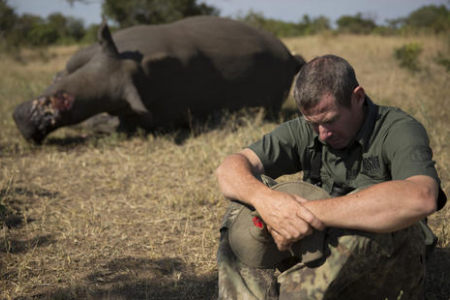Ivan Carter goes to W.A.R. for the animals
Having grown up in the African bush, Zimbabwe-born Ivan Carter is taking it upon himself to call attention to and help correct the wrongs he has seen - and continues to see - in his homeland.
On his new show Carter's W.A.R. (Wild Animal Response), the 46-year-old TV host, professional hunter and avid conservationist confronts wildlife transgressors trying to destroy the African bush's awe-inspiring habitat for tusks and horns.
Carter's W.A.R. will also help viewers understand the constant struggle the people of Africa endure just to fetch water from the nearby river and the importance and duty of conservation practices.
Carter was in town in April to promote Outdoor Channel Asia, which starts airing the documentary series in 16 countries such as Malaysia, the Philippines and Thailand from May 26.
The channel will be available in Singapore by the end of the year.
The father of a five-year-old boy and four-year-old girl, who now lives in the Bahamas, told The New Paper: "What do people do on Earth Day? Just think about the Earth?
"Thinking about something never got one thing done. It's not about thinking about doing something, it's about doing it. So what my goal is, through all the wildlife examples we touch on in the episodes, is to ensure that one day, our children will have the choice to explore the outdoors."
He added: "Conservation as a whole can be defined in one sentence: Identifying enough passionate people on the front line and giving them global support.
"We engage the general public to be more educated and will maybe want to help. Let's say someone wants to donate $5 but doesn't see the use of it. But what if one million people have that thought? If the world is engaged with these problems and understands the solutions, we can perhaps make $5 million, and with that, we can move a mountain."
Why have you decided to dedicate your life to this particular cause?
The most important thing for all of us is to have wildlife and wild places to remain in the future. What it comes down to is the next generation. If we don't look after the planet then our children will never get to see
(what) we see. They may not want to, but we have to preserve their ability to choose that.
I think it's important that somebody is telling the stories of the reality of what's happening with wildlife. It doesn't matter if you're talking about shark's fin soup or rhino horns or even man-eating crocodiles - any time that wildlife and humans are fighting against each other, humans always win. So there's got to be some of us who are fighting for the wildlife.
What are some of the wildlife issues you cover on the show?
Rhino horn poaching. A lot of the rhino horns end up here in Asia. There is a lot of controversy on the use of rhino horns but because it's a rare commodity, a lot of money changes hands and on the front line in Africa, the marketplace has a terrible effect on rhinos. There's less than 10 per cent today than there were just 50 or 60 years ago. There used to be rhinos across the whole of Africa and Asia and today, there isn't because there are more people on the Earth today than ever before. Everybody has to eat and everybody wants to have nice things and as certain communities get more wealthy and affluent and as the economy is thriving, what you find happening is all of these kind of commodities becoming more in demand.
Another example is elephant ivory. It doesn't have any medicinal properties but people want to have it as an ornament. A hundred elephants are poached a day in Africa just to supply that demand. And because a lot of money is involved, it becomes very worthwhile for these poachers to go against the security forces protecting these elephants.
Have you ever put your life at risk in the process?
We sometimes have confrontations with rhinos or elephants or lions, but to be honest, after 25 years of being in the field, I've learnt to deal with these situations. It very often looks a lot more dangerous than it is.
We once did a crocodile episode. There are tribal people who have to go into the river to fish and what ends up happening is they get in these tiny boats and very often these crocodiles take them off the boats and eat them and so in order to see what that really feels like, I got into one of these boats for a night.
The waters beneath me were black and the smell of dead fish was in the air as we fished and I knew the man-eating crocodiles were around me so it was a very intense feeling. But the message I hope to get out and the reason I do this trumps any fear I have.
When you were growing up in Zimbabwe, did you ever see poaching happen in front of your eyes?
Yes. In the 1990s, I was part of an anti-poaching team, where we tried to dehorn the rhinos before they got poached. Seeing these situations in front of my eyes and seeing how nobody is telling me these stories has driven me to do this show.
If you had the ultimate power and authority and could declare war on any organisation, what would it be?
I think it would be the middlemen within the wildlife trade. The ones at the frontline are poaching to feed their families but it's the middlemen who are making most of the profit because I think the marketplace is not necessarily bad. If the products were legally obtained and sold at a high value, that money would be going back into the wildlife.
Get The New Paper on your phone with the free TNP app. Download from the Apple App Store or Google Play Store now


